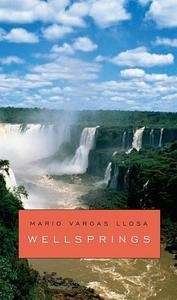Wellsprings

Editorial Harvard University Press
Fecha de edición mayo 2008
Idioma inglés
EAN 9780674028364
208 páginas
Libro
encuadernado en tapa dura
Resumen del libro
When a master novelist, essayist, and critic searches for the wellsprings of his own work, where does he turn? Mario Vargas Llosa Peruvian writer, presidential contender, and public intellectual answers this most personal question with elegant concision in this collection of essays. In Four Centuries of Don Quixote, he revisits the quintessential Spanish novel a fiction about fiction whose ebullient prose still questions the certainties of our stumbling ideals. In recounting his illicit, delicious discovery of Borges' fiction the most important thing to happen to imaginative writing in the Spanish language in modern times Vargas Llosa stands in for a generation of Latin American novelists who were liberated from their sense of isolation and inferiority by this Argentinean master of the European tradition.
In a nuanced appreciation of Ortega y Gasset, Vargas Llosa recovers the democratic liberalism of a misunderstood radical a mid-century political philosopher on a par with Sartre and Russell, ignored because he was only a Spaniard. And in essays on the influence of Karl Popper and Isaiah Berlin, the author finds an antidote to the poisonous well of fanaticism in its many modern forms, from socialist utopianism and nationalism to religious fundamentalism. From these essays a picture emerges of a writer for whom the enchantment of literature awakens a critical gaze on the turbulent world in which we live.
Biografía del autor
x{0026}lt;P x{0026}lt;B Mario Vargas Llosa x{0026}lt;/B (Arequipa, 1936 - Lima, 2025). Premio Nobel de Literatura, su carrera literaria se inició con el estreno de un drama en Piura y el libro de relatos x{0026}lt;I Los jefesx{0026}lt;/I , pero alcanzó notoriedad con sus novelas x{0026}lt;I La ciudad y los perrosx{0026}lt;/I (1962; Premio Biblioteca Breve y Premio de la Crítica) y x{0026}lt;I La casa verdex{0026}lt;/I (1966; Premio de la Crítica y Rómulo Gallegos). Escribió piezas teatrales x{0026} x02014;x{0026}lt;I La señorita de Tacna, Kathie y el hipopótamo, La Chunga, El loco de los balcones, Ojos bonitos, cuadros feos, Las mil noches y una nochex{0026}lt;/I y x{0026}lt;I Los cuentos de la pestex{0026}lt;/I x{0026} x02014;, estudios y ensayos x{0026} x02014;x{0026}lt;I García Márquez: Historia de un deicidio, Carta de batalla por Tirant lo Blanc, La orgía perpetua, La utopía arcaica, La verdad de las mentiras, La tentación de lo imposible, El viaje a la ficción, La civilización del espectáculo, La llamada de la tribux{0026}lt;/I y x{0026}lt;I La mirada quietax{0026}lt;/I x{0026}lt;/P x{0026}lt;P x{0026}lt;I (de Pérez Galdós)x{0026}lt;/I x{0026} x02014;, memorias x{0026} x02014;x{0026}lt;I El pez en el aguax{0026}lt;/I x{0026} x02014;, relatos x{0026} x02014;x{0026}lt;I Los cachorrosx{0026}lt;/I x{0026} x02014;, obra periodística x{0026} x02014;x{0026}lt;I El fuego de la imaginación, El país de las mil carasx{0026}lt;/I y x{0026}lt;I El reverso de la utopíax{0026}lt;/I x{0026} x02014;, x{0026}lt;I Conversación en Princetonx{0026}lt;/I , con Rubén Gallo, x{0026}lt;I Medio siglo con Borges, Dos soledades, Un bárbaro en París: Textos sobre la cultura francesa, y, sobre todo, novelas: Conversación en La Catedral, Pantaleón y las visitadoras, La tía Julia y el escribidor, La guerra del fin del mundo, Historia de Mayta, ¿Quién mató a Palomino Molero?, El hablador, Elogio de la madrastra, Lituma en los Andes, Los cuadernos de don Rigoberto, La Fiesta del Chivo, El Paraíso en la otra esquina, Travesuras de la niña mala, El sueño del celta, El héroe discreto, Cinco Esquinas, Tiempos reciosx{0026}lt;/I y x{0026}lt;I Le dedico mi silenciox{0026}lt;/I . Además de los mencionados, recibió los premios Cervantes, Príncipe de Asturias, PEN/Nabokov y Grinzane Cavour. Fue miembro de la Real Academia Española y de la Académie Française.x{0026}lt;/P








